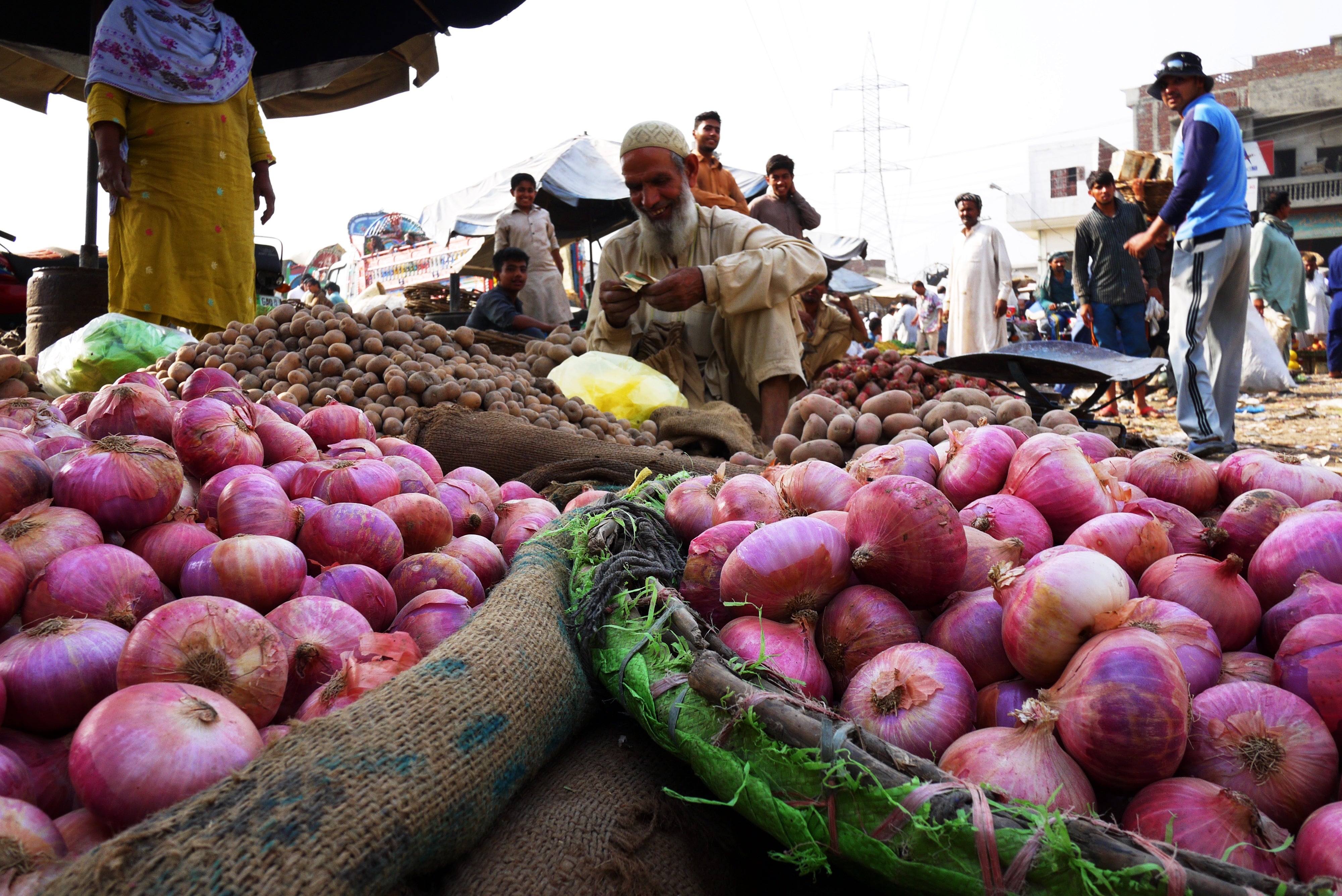 A red onion vendor at a Gujranwala market in Punjab, Pakistan.
A red onion vendor at a Gujranwala market in Punjab, Pakistan.
This blog is part of the 'Act Now Pakistan' series focusing on ideas, policies and actions for Pakistan to recover stronger and better as the COVID-19 crisis subsides.
Replacing a nearly century-old law, the PAMRA Act—short for Punjab Agriculture Marketing Regulatory Authority Act 2020—was approved by the Punjab Assembly last March. The reform establishes a new and more transparent legal regime to market agricultural produce to help safeguard the free flow of crops and stimulate food supplies. It also comes at a critical time as the COVID-19 pandemic is disrupting socio-economic activities and threatening food security.
Pakistan’s agricultural marketing system has long been shaped by the heavy hand of the government and marked by lack of transparency, the dominance of vested interests, unfair treatment to producers, and welfare losses to consumers. Farmers’ produce used to pass through seven or eight different hands before reaching the consumer. Consequently, market margins were high, but producers were left with little.
“There is an urgent need to revamp our agriculture marketing system, which has been neglected for too long,” says PAMRA Chairman, Naveed Bhinder. “We will focus on improving standards for grades and packaging as well as training on good agricultural practices for all stakeholders in the agricultural value chain, including farmers and logistic companies. We will also improve revenue collection and stop leakages so we can re-invest in our marketing infrastructure,” he added.
Pakistan’s agricultural marketing system has long been shaped by the heavy hand of the government and marked by lack of transparency, the dominance of vested interests, unfair treatment to producers, and welfare losses to consumers
Amid the COVID-19 outbreak, PAMRA has ensured that the trade of agricultural produce continues without comprising quality and safety. Disinfectant tunnels and temperature scans have become routine. Social distancing is enforced, and auction times are scattered to avoid congestion in the market yards. Direct trading arrangements and product standards defined through PAMRA provide more flexibility to farmers and traders and reassurance to consumers.
Overall, PAMRA will help enrich Pakistan’s food basket and provide a better deal for the farming community and consumers. These modernization efforts received support through the World Bank-funded SMART (Strengthening Markets for Agricultural and Rural Transformation) Project.
“As a grower, my primary concern is with true price discovery and prompt payment at the markets. If, as indicated in the law, the Authority focuses on fair auctioning, it will go a long way to meeting our demands,” said Mr. Rana Tufail, a farmer representative from Punjab.
Also, the new law presents opportunities to catch up with neighboring countries that are moving toward electronic settlement and e-auction systems.
How will the PAMRA Act transform Pakistan’s agriculture marketing systems?
The PAMRA Act allows the emergence of non-traditional market channels such as supermarkets, virtual markets, and farmer markets, changes the power structure of the market, and enhances financial efficiency and transparency. It will do so in the following ways:

- It mitigates the role of middlemen and changes the power structure of the market. It reduces government intervention, which always benefited vested interests at the expense of small and medium producers.
- The PAMRA Act ensures gender representation in the governing body of the Authority.
- It confines the role of market committees to governing and improving the efficiency of the market yards, but with broader representation of key stakeholders, including farmers and brokers.
- It reduces market fees and regulates grading and packaging standards. Only the first transaction between the grower and the trader will be charged; and the fee will be directly credited to the banks, reducing the need for coins and bills.
- It improves physical infrastructure and processing equipment for more reliable grading and inspections and for the recording of financial transactions.
- It allows multiple marketing channels to exist in parallel, replacing the monopoly of the mandi system. The private sector will be allowed to establish markets and collection centers. Farmers will be allowed to sell directly to retailers, bypassing the wholesale markets without having to register with PARMA.
- It will help expedite bulk warehousing services in the private sector and promote the development of Electric Warehouse Receipts. Producers will benefit from better access to formal credit.
- It establishes a robust agricultural market information system for Punjab province.
The PAMRA Act allows the emergence of non-traditional market channels, changes the power structure of the market, and enhances financial efficiency and transparency
As Mr. Wasif Khurshid, Secretary of the Department of Agriculture, put it, “the passage of the law will allow diverse marketing channels-for example farmer markets, private wholesale and specialized markets-thereby creating a healthy competition in service delivery and value-addition.”
Standard grading and packing regulated by the Act are good news to consumers. Ms. Kaneez Bibi, a buyer at Iqbal Town, said, “When I bought strawberries before, I was never sure that beneath the top layer the fruit would be of similar quality. Getting fruit and vegetables in standard grades would be a noticeable improvement.”
Mr. Abdur Razzaq, a visitor at Sunday Bazaar, Shaman Lahore, commented, “In the past, all agricultural produce used to be sold in loose packing, making it hard to tell the weight or number of pieces in a bag. That will change with uniform packaging.”



Join the Conversation